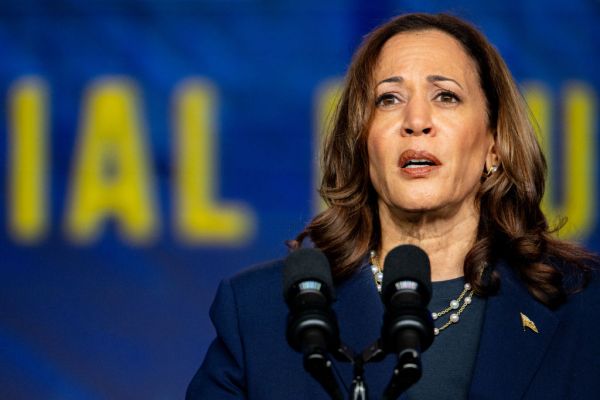Happy Tuesday! Not sure what to get that loved one who’s impossible to buy for this holiday season? How about a month—or a year—of The Dispatch? We guarantee they’ll get more value from a gift membership than they would another necktie or pair of socks. Click here to check out our gifting options and schedule the email to be delivered at a date and time of your choosing!
Quick Hits: Today’s Top Stories
- Jailed Russian opposition leader Alexei Navalny is missing in Russia’s prison system, his spokeswoman Kira Yarmysh reported Monday, after lawyers contacted the two penal colonies where he’s thought to be held and both reported he was not present. Navalny, who is serving a more than 30-year sentence on charges widely viewed as political retribution for his opposition to Russian President Vladimir Putin, failed to appear by video link for a scheduled court appearance—which Russian authorities blamed on an electrical issue. The Biden administration said it was “deeply concerned” about Navalny’s disappearance, which comes as Putin announced on Friday his intention to seek another term.
- India’s Supreme Court on Monday upheld Prime Minister Narendra Modi’s 2019 decision to strip the Jammu and Kashmir region of its autonomous status and divide it into two federally administered territories. The decision officially revoked Article 370, which had given special rights to the Muslim-majority state. The ruling, which was rejected by Kashmir’s political leaders, marked a victory for Modi’s Hindu nationalist Bharatiya Janata Party ahead of elections in the spring of next year.
- The Polish parliament officially voted on Monday to elevate former European Council President Donald Tusk to prime minister, ending eight years of European Union-skeptical rule in Warsaw. Tusk, who served as Polish prime minister from 2007 to 2014, was elected to the post after lawmakers shot down a last-ditch effort by the outgoing right-wing Law and Justice Party to form a government. Tusk—whose coalition was victorious in October’s election—will likely attempt to mend Poland’s relationship with the EU.
- Special counsel Jack Smith on Monday petitioned the Supreme Court to decide whether former President Donald Trump is immune from prosecution in Smith’s 2020 election case, seeking to expedite the appeals process so Trump’s trial—originally scheduled for early March—could proceed as planned if Trump is found not to be immune. District Judge Tanya Chutkan decided earlier this month Trump could be prosecuted, but Trump’s lawyers appealed, arguing the Senate acquitted Trump of any wrongdoing in his 2021 impeachment trial and that trying him again would amount to legal double jeopardy. “This case presents a fundamental question at the heart of our democracy,” wrote Smith in his filing. “Whether a former President is absolutely immune from federal prosecution for crimes committed while in office or is constitutionally protected from federal prosecution when he has been impeached but not convicted before the criminal proceedings begin.” Later Monday, the Supreme Court agreed to expedite consideration of Smith’s petition, and ordered Trump to respond to the petition by next Wednesday.
- The Texas Supreme Court on Monday overturned a ruling by a lower state court that would have allowed a woman to seek an emergency abortion despite strict state laws banning the procedure in the state with very limited exceptions. Kate Cox, who is pregnant with a child diagnosed with Trisomy 18, has now left the state to seek an abortion, according to her representation at the Center for Reproductive Rights. In its ruling, the Texas Supreme Court argued that Cox’s doctors “could not, or at least did not, attest to the court that Ms. Cox’s condition poses the risks the exception requires”—namely a threat to the life of the mother.
- California Assemblyman Vince Fong, a Republican, announced Monday he will run for outgoing Rep. Kevin McCarthy’s House seat. In a statement announcing his candidacy, Fong framed his decision to run for office as “an attempt to unite our community in this critical moment in our nation’s history.” Fong’s declaration came hours after Republican State Sen. Shannon Grove said she would not join the race to replace McCarthy, who announced last week that he will retire from Congress at the end of this year.
The Government Marches In

We’ve read a few times now in the comments just how much our TMD readers enjoy a good map. As proponents of using visual aids to help with complex topics, we’d like to start today’s newsletter with a simple diagram explaining drug costs and revenue. The White House announced last Thursday a potential complication to the legend below.

The Biden administration published new draft guidelines last Thursday that could allow federal agencies to suspend exclusive patents issued to pharmaceutical companies for medicines developed using government-funded research and offer licenses to other companies to produce and sell the drugs. The proposed rule could provide the government an expansive new tool to lower prices on some drugs, but also risks disincentivizing companies from using government-funded research to develop new pharmaceuticals.
Under previous Democratic and Republican administrations, the law governing such patents was largely understood as a backstop to ensure that the companies the government granted exclusive patents to actually brought the inventions and products to market. But the Biden administration appears poised to try to use the government’s authority—known as “march-in” rights—more expansively as a tool to target high drug prices.
“We’ll make it clear that when drug companies won’t sell taxpayer-funded drugs at reasonable prices, we will be prepared to allow other companies to provide those drugs for less,” said Lael Brainard, director of the National Economic Council (NEC). Brainard’s boss, President Joe Biden, echoed the sentiment last week. “Folks, right now, 25 of the largest pharmaceutical companies in America control 70 percent of the market,” he tweeted. “This [move] is an important step toward ending Big Pharma price gouging.”
To understand the potential ramifications of Biden’s proposed change, we first need to take a step back. The new guidance framework, drafted by the National Institute of Standards and Technology (NIST), falls under a 1980 law commonly referred to as the Bayh-Dole Act (named after its cosponsors, the late Sens. Birch Bayh and Bob Dole). The landmark piece of patent legislation standardized and simplified federal intellectual property law, allowing companies to take advantage of exclusive patents for products and inventions that stemmed from government-funded research.
“Before that act, anytime there was an invention made with government-funded research, the government owned the patent,” said Joel Zinberg, a director at the Paragon Health Institute and former senior economist at the White House Council of Economic Advisers during the Trump administration. “They would only grant non-exclusive licenses to developers. So you had a situation where few companies were going to invest the money and time necessary to transform the discovery into a practical product unless they could own it and exclude others from using it.” This is particularly true for pharmaceuticals, which can take millions (sometimes hundreds of millions) of dollars to develop and years to progress through clinical trials before they can be sold.
The act was intended to solve the problem of government-funded research and breakthroughs going to waste—in 1980, less than 5 percent of all patents held by federal agencies had been licensed to companies. “The purpose of our act was to spur the interaction between public and private research so that patients would receive the benefits of innovative science sooner,” Bayh and Dole wrote in 2002. That same year, The Economist praised the law as “possibly the most inspired piece of legislation to be enacted in America over the past half-century.” Suffice to say, the Bayh-Dole Act worked. The innovations made possible by the law contributed between $374 billion and $865 billion to the U.S. GDP between 1996 and 2017, according to an estimate by the Association of University Technology Managers. In the last 40 years, more than 200 drugs and vaccines have been developed using public research.
The law also included a mechanism to ensure that companies granted exclusive patents actually used them productively. Federal agencies were empowered to “march in” and suspend exclusive patents if companies haven’t brought a product to market or made sure that it was available on “reasonable terms.” This march-in authority hasn’t previously been used to address prices, however—so long as the products are reasonably available on the market, the conditions of the law are satisfied. Former National Institutes of Health (NIH) Director Dr. Francis Collins has said the act wasn’t designed to address drug prices, and Dole and Bayh both argued that their law does not apply to pricing. “Bayh-Dole did not intend that government set prices on resulting products,” the pair argued. “The law makes no reference to a reasonable price that should be dictated by the government. This omission was intentional.” In fact, no federal agency has ever exercised march-in authority, and multiple administrations (including the Biden administration) have rejected previous petitions to use march-in rights to lower prices.
The new guidelines take a different tack, saying explicitly that agencies will consider “the reasonableness of the price” and whether “the price is extreme, unjustified, and exploitative of a health or safety need” when evaluating patent use. The new NIH Director, Dr. Monica Bertagnolli, suggested last week she would be open to using march-in authority to improve patient access to drugs. “What I will affirm over and over is that I will use every tool I possibly can with the goal of obtaining the access that our patients need,” she said. “March-in, if I am to ever apply that, it will be according to principles that allow it to really achieve that specific aim.”
Industry stakeholders have balked at the proposal. “This would be yet another loss for American patients who rely on public-private sector collaboration to advance new treatments and cures,” said Megan Van Etten, a spokesperson for the Pharmaceutical Research and Manufacturers of America (PhRMA)—the trade group representing pharmaceutical companies’ interests in Washington. “The administration is sending us back to a time when government research sat on a shelf, not benefiting anyone.”
Pharma companies have long claimed that reforms designed to lower costs will hurt innovation. But some health care officials and researchers believe such claims are justified when it comes to these new guidelines, arguing that suspending patent exclusivity based on high prices will lead companies to develop fewer products that rely on government-funded research. “If a program is heavily reliant on NIH funding, investors might devalue its existing patents, leading to less funding for NIH-derived molecules,” argued Dr. Scott Gottlieb, the former commissioner of the Food and Drug Administration (FDA) who currently serves on the boards of Pfizer and Illumina. “Ultimately, the policy could diminish the societal value of NIH investments, as more NIH-funded research may remain unused, and prompt some investors to look harder for molecules developed outside the U.S.” NIST itself noted in the guidelines, “March-in is an important tool for agencies, but that tool is accompanied by potentially significant positive and negative ramifications.”
Joseph Allen, a Sen. Bayh staffer who worked on passing and amending the Bayh-Dole Act, also warned of the unintended consequences stemming from key undefined terms. “There is no statutory definition of ‘reasonable pricing’ in the law,” he said, “so that term is completely arbitrary.” The lack of clarity in what the government considers an unreasonable price could also spook investors by introducing uncertainty. “Investors and drug companies tend to overestimate, rather than underestimate, these kinds of policy risks, incorporating uncertainty about its application in the future,” Gottlieb added. “They often assume the worst, magnifying the impact of a policy misstep.”
Ben Ippolito, a senior fellow at the American Enterprise Institute studying healthcare economics, argues that march-in rights are a “particularly costly” tool to try and reduce drug prices. If regulators wanted “to make a policy that lowers drug prices with the least cost possible,” he told TMD, they should “spell out an explicit framework” through legislation. “You can have that debate about what’s worth paying for and how to draw those lines,” he said. “A bad policy is to say, ‘Well, in the future, I or some other president is going to decide what an appropriate number is the price for your drug. And if they don’t like it, well, then unfortunately, you no longer have your intellectual property.’”
Critics of the proposals also argue it will disproportionately affect startups trying to develop breakthrough technologies beyond health care. “Ironically, the impact of this confusion will fall on the very entrepreneurial small companies that drive American innovation,” Allen argued. “They must rely on venture capital to exist, and the new guidelines will make potential investors wary of backing them when the government threatens to license their competitors under these vague guidelines. The resulting damage won’t be limited to drug development. So many nascent technologies to counter climate change, improve the environment, and address food insecurity are now at risk.”
Who’s asking for this, then? Patient advocacy groups, some health researchers, and progressive lawmakers have pushed federal agencies for years to take advantage of march-in power to lower drug prices and improve access to costly treatments. Some health law researchers argue that laws passed after the Bayh-Dole Act have increased the power and duration of pharmaceutical patents, insulating pharma companies from competition for too long and inflating prices. And pharma companies don’t have a sterling record of keeping with the spirit of U.S. patent law—drug manufacturers often make superficial changes to their drugs like adjusting delivery mechanisms or dosages to create “patent thickets,” or to “evergreen” existing patents to extend exclusivity and fend off competition from generics.
But it’s unclear how much of an effect march-ins could have on drug prices. A study released last month (and funded by pharma companies) analyzed a group of 361 drugs approved by the FDA between 2011 and 2020 and found that 92 percent would not be eligible for march-ins. Whether or not a developed drug was built on enough government-funded research to be subject to a march-in will likely be contested. As NIST conceded in the Biden administration’s proposal, “whether an invention is a subject invention can be a complex and fact-intensive inquiry.” NIH acknowledged as much when the agency rejected a petition to use march-in rights to lower the price of a prostate cancer drug earlier this year. “Given the remaining patent life and the lengthy administrative process involved for a march-in proceeding,” the agency wrote in March, “NIH does not believe that use of the march-in authority would be an effective means of lowering the price of the drug.”
Plus, without statutory changes to the Bayh-Dole Act, it’s unclear if the Biden administration’s proposed guidelines, once adopted, will survive legal scrutiny. “These authorities are in existing laws, the last administration just didn’t want to allow them to be used in this way,” claimed Brainard, the NEC director and Biden adviser. But Republican lawmakers like Sen. Bill Cassidy, the ranking member of the Senate Committee on Health, Education, Labor, and Pensions, disagreed, saying the administration “does not have the legal authority for this use of march-in rights.”
The extent of that legal authority will be scrutinized pretty much immediately, according to Richard Frank, the director of the Brookings Schaeffer Initiative on Health Policy. “Almost anything that comes out here is going to be subject to legal challenges,” he told TMD. Pharma companies are currently suing the Biden administration over provisions in the Inflation Reduction Act concerning Medicare drug price negotiations.
The guidelines have entered a two-month public comment period before the administration finalizes the framework early next year.
Worth Your Time
- Regulating pharmaceutical prices and patents isn’t the only new rule on the Bidenomics menu this winter—a new proposal from the Biden administration would further regulate the federal au pair program, which some critics argue could “disproportionately burden highly skilled working mothers, maybe even to the point of driving more of them out of the workforce.” Writing for Reason, Alex Nowrasteh details his own family’s experience with the program during the pandemic, and points to the cratering of Massachusetts’ au pair program as a result of similar regulations the Biden administration is considering. “In December 2019, the U.S. Court of Appeals for the First Circuit ruled that Massachusetts’ high minimum wage applied to au pairs—a previously excluded category of workers,” he wrote. “Beginning on January 1, 2020, the weekly wage for au pairs increased by 170 percent including a minor deduction for supplying free room and board. Predictably, the number of new au pairs moving to Massachusetts collapsed as middle-class families were priced out.”
Presented Without Comment
The Washington Post: Man Charged with Threatening to Kill GOP Candidate Vivek Ramaswamy
Also Presented Without Comment
Yahoo Sports: Shohei Ohtani to Defer All but $20M of His $700M Dodgers Contract Until After Its Completion in 2034
Toeing the Company Line
- Reminder: Readers in the Pacific Northwest can join Jonah, Kevin, and fellow members of The Dispatch community in Bellevue, Washington, for a meet-and-greet gathering at 6 p.m. PT on Thursday, December 14. You can expect plenty of casual socializing before and after the main programming: a one-hour Q&A session with Jonah and Kevin. Seats are going quickly, so be sure to register for the event here.
- It’s Tuesday, which means Dispatch Live (🔒) returns tonight at 8 p.m. ET/5 p.m. PT! The team will discuss the news of the week and, of course, take plenty of viewer questions! Keep an eye out for an email later today with information on how to tune in.
- Alex took a hard look at misleading claims about the newly released January 6 security footage—and right-wing media’s selective amplification of “peaceful protesters.”
- In the newsletters: Kevin mustered a defense (🔒) of private security screening in airports, the Dispatch Politics team looked at the political ramifications of Hunter Biden’s criminal proceedings, and Nick mused some more (🔒) about a potential second Trump term.
- On the podcasts: In a marathon episode of Advisory Opinions, Sarah and David try to figure out if WilmerHale will charge the university presidents for their congressional testimony and ponder whether the ACLU can make a comeback in NRA v. Vullo.
- On the site: Stirewalt wonders if Iowa’s political relevance is coming to an end.
Let Us Know
Do you think the Biden administration’s proposal, if enacted, will have the intended effect of lowering drug prices?










Please note that we at The Dispatch hold ourselves, our work, and our commenters to a higher standard than other places on the internet. We welcome comments that foster genuine debate or discussion—including comments critical of us or our work—but responses that include ad hominem attacks on fellow Dispatch members or are intended to stoke fear and anger may be moderated.
You are currently using a limited time guest pass and do not have access to commenting. Consider subscribing to join the conversation.
With your membership, you only have the ability to comment on The Morning Dispatch articles. Consider upgrading to join the conversation everywhere.